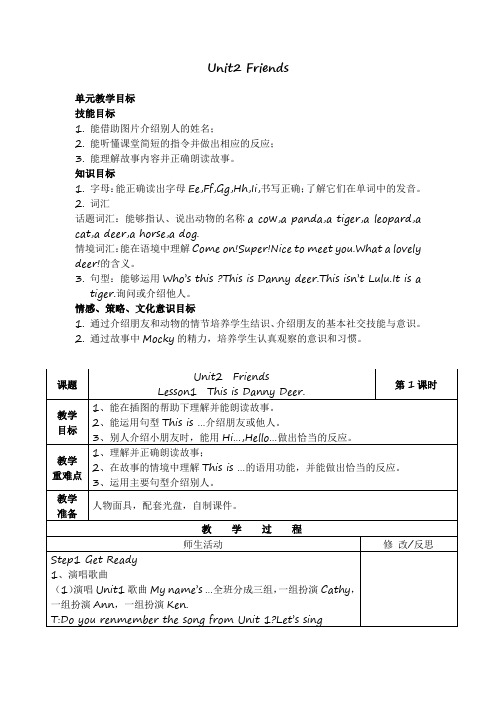北师大版三年级英语上册语法知识
三年级英语上册知识总结北师大版

北师大版小学英语三年级上册第三单元Unit3 Playing together

Unit3 Playing together单元教学目标技能目标1.能够询问和介绍某人是谁;2.能够听懂有关传球、接球等简单的球类运动指令,并做出反应;3.能够理解故事内容并朗读人物对话。
知识目标:1.字母:能够正确读出字母Jj,Kk,L1,Mm,Nn,字母书写规范;了解它们在单词中的发音。
2.词汇:话题词汇:能够说出以下动作指令并做出反应:play,pass,catch,kick.情景词汇:能够在语境中理解:cousin,great,poor, Mocky,Be careful!Ouch!的含义。
3.句型:能够在适当的情景中运用句型:Pass the ball !Catch the ball ! Kick the ball!Throw the ball !Who’s that/this?This is/That is…情感、策略、文化意识目标1.通过故事学习,培养学生了解体育运动、乐意参与体育活动的意识;2.培养学生在体育运动中集中注意力、注意安全的意识与习惯。
单元内容分析本单元的话题是“文体活动”,单元内容是对前两个单元的延伸和拓展。
本单元是在第一单元介绍自己姓名、第二单元介绍别人姓名的基础上,丰富介绍人物的语言,增加了说明人物与自己的关系的用法。
这三个单元的内容都是围绕学生以及学生周围的人展开的,内容贴近学生的生活,有利于学生模仿、表达,有利于在学生刚刚开始学英语时就形成学英语、用英语的意识。
故事内容围绕着球类运动中的动作展开,由于小学生活泼好动,喜欢参加球类运动,因此比较贴近学生生活。
故事中Mocky,Ann和Ken一起参加足球运动,在踢球的过程中呈现了本单元的主要学习内容:有关球类的动作指令Pass the ball!Catch the ball!Kick the ball 1故事中也充满了悬念。
当淘气的Mocky踢球时,球直奔窗户而去,正当大家都捏了一把汗的时候,事情出现了转机,一个小朋友接到了球。
北师大版小学英语三年级上册第二单元Unit2 Friends

Unit2 Friends
单元教学目标
技能目标
1.能借助图片介绍别人的姓名;
2.能听懂课堂简短的指令并做出相应的反应;
3.能理解故事内容并正确朗读故事。
知识目标
1.字母:能正确读出字母Ee,Ff,Gg,Hh,Ii,书写正确;了解它们在单词中的发音。
2.词汇
话题词汇:能够指认、说出动物的名称a cow,a panda,a tiger,a leopard,a cat,a deer,a horse,a dog.
情境词汇:能在语境中理解Come on!Super!Nice to meet you.What a lovely deer!的含义。
3.句型:能够运用Who’s this ?This is Danny deer.This isn’t Lulu.It is a tiger.询问或介绍他人。
情感、策略、文化意识目标
1.通过介绍朋友和动物的情节培养学生结识、介绍朋友的基本社交技能与意识。
2.通过故事中Mocky的精力,培养学生认真观察的意识和习惯。
北师大版小学英语三年级上册第一单元Unit 1 Hello!

Unit 1 Hello!
单元教学目标
技能目标
1.能用英语和他人打招呼,说再见。
2.能用英语询问他人的姓名,能说出自己的英文名字。
3.能够理解故事内容并能够分角色朗读故事。
知识目标
1.字母:能读出字母Aa,Bb,Cc,Dd,书写正确。
了解它们在单词中的发音。
2.词汇:
话题词汇:能够指认、说出打招呼、道别及询问他人姓名的单词和短语hi,hello,good morning,Ann,Ken,Mocky,Uncle Booky.
情境词汇:能在语境中理解come,meet,children的含义。
3.句型:
能用Hi.Hello!Good morning.打招呼;
能用What’s your name?询问他人姓名。
能用My name’s… I’m…作自我介绍。
情感、策略、文化意识目标
1.培养和建立学生学习英语的乐趣以及信心。
2.培养学生主动打招呼、乐意结识新朋友的意识。
长春中心小学 北师大版小学英语三年级上册

长春中心小学北师大版小学英语三年级上册陈秋儿 Unit4 Ann’s family第二课时词汇教学一、指导思想与理论依据:本节课通过创设动画情境--- family tree,在影象的立体视觉效应下,在新颖、趣味的语境下,学习grandfather grandmother mother father uncle aunt brother sister 等家庭成员的词汇。
从“音、义、形”三方面准确把握词汇的读音,理解词义。
把握词汇的认读,使学生在交流与体验中学习如何应用语言。
进而在小组中进行家庭成员的介绍,进一步巩固与操练。
从而培养学生大胆开口,善于交际的习惯和能力。
英语«新课标»中强调,注重激发和培养学生学习英语的兴趣和成就感。
关注学生的生活经验和认知水平,提倡体验。
实践。
参与。
探究的学习方式,使学生形成一定的综合语言能力。
二、教学背景分析1、教材分析本课是北师大小学英语三年级上册第四单元第2课时,即词汇教学。
在第一课时故事教学学习的基础上,学生对本单元的部分词汇能够认读与理解。
因此,本课时在巩固旧知识的基础上加以新词的拓展。
本课时的词汇教学也是为后几课时的语言输出做出了重要的桥梁作用。
对于本单元的教学内容在整本教材中也起到了承上启下。
既是对前几单元语言结构的强化与巩固,也是对后一单元的延伸做铺垫。
2、教学内容分析本课时的词汇包括:grandfather grandmother uncle aunt mother father brother sister。
在第一课时中学生已了解了mother father brother sister四个单词。
本课将进一步学习grandfather grandmother uncle aunt四个新词,注重音、义、形的教学过程,依托This is… That’s…句型,让学生在句子中巩固和应用词汇,作到词不离句。
3、教学方式和手段说明以贴近学生生活,创设轻松氛围,调动学生热情,激发学生参与为出发点。
北师大版(三起)(2024)英语三年级上《Unit 3 Learning Lesson 3》教学设计

北师大版(三起)(2024)小学英语三年级上册《Unit 3 Learning Lesson 3》教学设计一、教学内容本单元的主题是“Animals”,Lesson 3的主要内容包括学习关于动物的单词和描述动物特征的句型。
具体内容如下:单词:tiger,lion,panda,monkey,elephant。
句型:Look at the...It's...二、学情分析三年级的学生刚刚接触英语,对英语学习充满了好奇和兴趣。
他们具有较强的模仿能力和表现欲望,喜欢通过游戏、歌曲等形式学习英语。
在之前的学习中,学生已经学习了一些简单的英语单词和问候语,为本课的学习奠定了一定的基础。
但是,由于学生的英语基础较为薄弱,词汇量有限,在学习新单词和句型时可能会遇到一些困难。
因此,在教学过程中,教师要注重创设生动有趣的教学情境,采用多种教学方法,激发学生的学习兴趣,帮助学生克服学习困难。
三、教学目标知识目标学生能够运学生能够听懂、会说、认读单词tiger,lion,panda,monkey,elephant。
用句型“Look at the...It's...”描述动物的特征。
能力目标培养学生的听说读写能力。
培养学生的观察能力和语言表达能力。
情感目标激发学生对动物的热爱之情,培养学生保护动物的意识。
培养学生的合作精神和竞争意识。
四、教学重难点教学重点掌握单词tiger,lion,panda,monkey,elephant的发音和拼写。
运用句型“Look at the...It's...”描述动物的特征。
教学难点单词elephant的发音。
句型“Look at the...It's...”的灵活运用。
五、教学策略直观教学法:通过图片、实物、多媒体等直观教具,让学生直观地感受和学习英语。
情景教学法:创设生动有趣的教学情境,让学生在情境中学习英语。
游戏教学法:通过游戏的形式,激发学生的学习兴趣,巩固所学知识。
北师大版小学英语(三年级起点)三年级上册单词默写表
n.铅笔
12
n.蜡笔;蜡笔画
13
n.书;本子v.预定,定(房间、车票等)
14
n.统治者;支配者;尺;直尺
4
n.鹿;复数deer
5
pron.它
6
n.老虎
7
a.&pron那,那个conj.那,那个(引导宾语从句等)ad.那么,那样
8
ad.不,不是a.没有,无,不
9
ad.不,没
10
n.猫
11
n.狗
12
n.母牛,奶牛v.吓唬
13
n.熊猫
14
n.马
Unit3
序号
单词默写
翻译
1
vt.传,递;经过;通过;超过n.通行证;关隘
2
art.这(那)个,这(那)些(用于特定人或物,序数词,最高级,专有名词,世上独一无二事物前)
3
n.球;舞会
4
v.玩;打(球);游戏;播放(过去式:played)n.玩耍,戏剧
5
n. (英式)足球;(美式)橄榄球
6
int. (口语)好,对,不错
7
v.抓住;赶上
8
v.&n.踢
9
v.扔;投掷
10
pron.谁
北师大版小学英语(三年级起点)三年级上册
Unit1
序号
单词默写
翻译
1
pron.什么,怎么样a.多么,何等;什么
2
v.是be的现在式第三人称
3
pron.你的;你们的
4
n.名字,姓名,名称;名义vt.命名,名叫
5
int.你好;嗨(表示打招呼、问候或唤起注意)
6
int.喂;你好(表示打招呼,问候或唤起注意)
北师大版英语三年级上册Units1-5 重难点知识归纳总结
北师大版英语三年级上册Units1-5Unit 1 Hello!【重点词汇】1. what 什么2. is3. your 你的;你们的4. name 名字;姓名5. hi 喂,你好6. my 我的7. I 我8. am9. and 和,与10. good morning 早上好11. children 孩子,儿童12. goodbye 再见13. bye 再见【重点句型】1. Hello! What’s your name? 你好!你叫什么名字?2. My name’s Mocky. 我的名字叫莫奇。
3. Ann’s my name. 安是我的名字。
4. Hi!I’m Ken. 你好!我是肯。
5. Good morning! I’m Peter. 早上好! 我是彼得。
Unit 2 Friends【重点词汇】1. this 这,这个2. look 看3. a 一(个,只)4. deer 鹿5. it 它6. tiger 老虎7. that 那,那个8. no 不,不行9. not 不,没,不是10. cat 猫11. dog 狗12. cow 奶牛13. panda 熊猫14. horse 马【重点句型】1. This is Danny Deer. 这是丹尼鹿。
2. This is Lulu Leopard. 这是露露豹。
3. Let’s go. 我们走吧。
4. What a lovely deer! 多么可爱的鹿啊!5. It’s not a cat. 它不是猫。
6. It’s a dog. 它是狗。
7. —What’s this? 这是什么?—It’s a tiger. 它是一只老虎。
8. —What animal is it? 它是什么动物?—It’s a cat. 它是一只猫。
Unit 3 Playing Together【重点词汇】1. pass 传2. the3. ball 球4. play 玩,玩耍5. football 足球6. OK 好,行,可以7. catch 接住,抓住8. kick 踢9. throw 扔10. who 谁11. he 他12. cousin [堂]表兄弟姐妹13. she 她14. friend 朋友【重点句型】1. Let’s play football. 我们一起踢足球吧。
北师大版小学三年级上册英语词汇
北师大版小学三年级上册词汇
Unit1 Don't walk!
Left right Again Litter 左;左边右;右边对;正确的再;又乱扔;乱丢thank you touch Move money 谢谢触;摸动;移动钱;货币worry cry parking food 担心;着急哭;呼喊停车食品;食物Smoking camera don’t
吸烟照相机(=do not) 不是;不要;不做,不干very good
很好
Unit2 How much?
Altogether change toy train
总共;完全地零钱;兑换玩具火车
机器人十一十二十三
十四十五十六十七十八十九二十
捉贼!多少钱干(做)得好!
学习;书房CD播放机谁的
光盘录影带电视对不起;抱歉
随身听盒式磁带无线电;录音机桌子
计算机(计算机)键盘鼠标
门这里,在这里到……里敲;打;击欢迎客厅卧室睡觉
浴室;洗手间洗河;河流厨房烹饪;做饭学习玩耍吃;食用喝;饮画画;粉刷
他们;她们;它们的伟大的;重要的;好极了我们的办公室学校数学教室
英语音乐艺术;美术汉语;中文P.E. Teacher’s Day playground
体育教师节运动场;操场Unit6 Review
Christmas Party gift parents 圣诞节晚会;聚会礼物;礼品父母Open Merry Christmas
打开圣诞节快乐!。
(完整)北师大版英语三年级上册教材解读
(完整)北师大版英语三年级上册教材解读简介该文档旨在对北师大版英语三年级上册教材进行解读,提供教材目录和关键内容的概述。
教材目录1. 单元一:Hello!2. 单元二:My Family3. 单元三:My School4. 单元四:Food and Drink5. 单元五:Toys and Games6. 单元六:Weather and Seasons7. 单元七:Animals8. 单元八:My Body9. 单元九:Transportation10. 单元十:Holidays关键内容解读单元一:Hello!该单元主要介绍基本的问候语和自我介绍,学生将研究如何用英语打招呼和问候他人。
通过故事、绘本和相关活动让研究更加生动有趣。
单元二:My Family在这个单元中,学生将研究如何描述家人以及家人之间的关系。
通过练口语和听力,学生能够掌握用英语表达家庭成员的基本词汇和句子。
单元三:My School该单元重点介绍学校的基本环境和研究用具。
学生将研究用英语谈论自己的学校、老师和校园生活。
单元四:Food and Drink在这个单元中,学生将研究关于食物和饮料的词汇,并能够用简单句子描述自己喜欢或不喜欢的食物。
通过练与同伴的对话,学生将提高口语表达能力。
单元五:Toys and Games该单元引导学生研究用英语描述玩具和游戏,并与同伴分享自己的玩具和游戏经历。
学生将通过与同伴互动提高口语交流能力。
单元六:Weather and Seasons学生将研究如何用英语描述天气和季节,并能够询问他人关于天气的情况。
通过听力练和口语对话,学生将提高自己的交流能力。
单元七:Animals在这个单元中,学生将研究描述不同动物的词汇,并能够用简单句子谈论自己喜欢的动物。
通过与同伴合作完成任务,学生将提高自己的合作和表达能力。
单元八:My Body该单元介绍身体部位的英文表达方式,并引导学生研究如何用英语描述自己和他人的外貌特征,培养学生准确表达的能力。
- 1、下载文档前请自行甄别文档内容的完整性,平台不提供额外的编辑、内容补充、找答案等附加服务。
- 2、"仅部分预览"的文档,不可在线预览部分如存在完整性等问题,可反馈申请退款(可完整预览的文档不适用该条件!)。
- 3、如文档侵犯您的权益,请联系客服反馈,我们会尽快为您处理(人工客服工作时间:9:00-18:30)。
北师大版三年级英语上册语法知识
以下是WTT为大家整理的【北师大版三年级英语上册语法知识】,供大家参考!否定句型:
Don't + 动词原形→例:Don't move. 不要动。
No + 动词ing →例:No swimming. 不要游泳。
No+ 名词s →例:No cameras. 不要照相。
单复数变化
☆单数提问时,牢记:is 用于单数
1. How much is the ball? ——It's eleven yuan.
2. How much is it ? ——It's nine yuan.
☆复数提问时,牢记:are 用于复数
1. How much are they? ——They are nineteen yuan.
2. How much are these shirts? ——They are seventeen yuan.
☆用于计算:How much is eight and nine? ——It's seventeen.
单数提问牢记:is 是、this 这个、that 那个,都是指单数
例:Whose radio is this? 这是谁的收音机?It's Bobby's. 是鲍比的。
复数提问提问牢记:are 是、these 这些、those 那些,都是指复数
例:Whose CDs are these? 这些是谁的光盘?They're Ken's. 它们是肯的。
单数变复数:is 变成are
例如:This is ---变成These are
That is ---变成Those are
名词单数变名词复数(要加s / es /变y为i再加es)注意下列划线部分变化
例如:单数句型This is Ken's walkman. 变成复数→These are Ken's walkmans.
单数句型That is Mocky's video. 变复数:Those are Mocky's videos.
复数变单数:are 变成is
These are---变成This is --
Those are---变成That is--
复数名词加了s ,单数就变回原形
例:复数句型: These are Ann's cassettes. 变单数→This is Ann's cassette.
Those are Aunt Booky's CDs. 变单数→That is Aunt Booky's CD.
句型表达:
现在进行时的表达形式:动词+ing:
1.直接+ing:例如:studying 学习eating 吃
2. 去结尾e+ing: 例如:dancing 跳舞writing 写字
3. 双写结尾字母+ing:例如:running 跑步swimming 游泳
现在进行时,疑问句型:be(am, is, are)+doing
例:What is he doing? 他在干什么?He is sleeping. 他在睡觉。
一般现在时的句型
例如:介绍房间→ This is the living room. 这是客厅。
一般疑问句(分单数提问/复数提问):
单数提问:Is this your pen? 这是你的钢笔吗?Yes, it is. 是的,它是。
复数提问:Are these our books? 这些是我们的书吗?Yes, they are. 是的,它们是。
